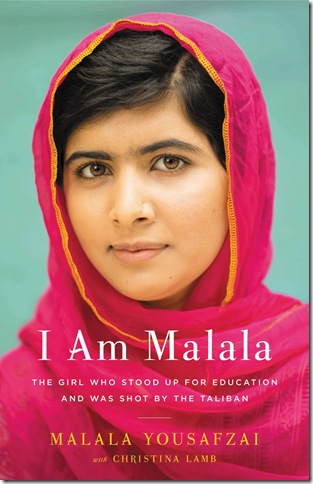Many will recall the electrifying speech delivered last summer at the United Nations by a 16-year-old Pakistani girl who had been shot by the Taliban.
Her crime? She had publicly advocated education for girls at a time when the Taliban was burning down schools and threatening girls and teachers.
I Am Malala offers a gripping account of that awful day when a Taliban fanatic boarded Malala’s school bus and shot her in the face. The bullet did not enter her brain, although it caused extensive injury. Doctors performed multiple surgeries in desperate attempts to save her life.
One cannot help but marvel at her steadfast commitment to the ideal of universal education for boys and girls. Malala’s father, Ziauddin, had inspired his daughter with his own dedication to girls’ education. He founded schools for boys and girls and defied Taliban leaders who demanded that he shutter the schools.
Malala grew up in the Swat Valley, a section of Pakistan near the border with Afghanistan. She was 10 when the Taliban swept into the region and began a campaign of terror, marked by suicide bombings, executions, public whippings and the destruction of schools.
Displaying incredible courage for someone so young, Malala began giving speeches and granting interviews in support of education for girls. At the suggestion of the British Broadcasting Company she kept a diary, which was then read on the air. “I began to see,” she says, “that the pen and the words that come from it can be much more powerful than machine guns, tanks or helicopters.”
Even though she feared that the Taliban might throw acid in her face to silence her, she refused to stop her advocacy.
Malala was hungry for education. She devoured books, including A Brief History of Time, by Stephen Hawking and The Alchemist, by Paulo Coelho.
Malala embraced her Islamic faith and believed that the Taliban misrepresented the Quran. Instead of revenge, she advocated compassion and forgiveness. She once wrote a letter asking God to “make me perfect because I want to make this world perfect.”
The attempted assassination ignited international outrage. President Obama called the shooting “reprehensible.” Thousands of people sent her cards.
Malala has strong political views. She denounced U.S. drone attacks against suspected Taliban leaders, noting that the attacks often kill innocent civilians. One drone hit an Islamic school, killing 82 people, including young boys, which inflamed hatred of the United States. After the book was published, a U.S. drone killed the head of the Taliban in Pakistan. However, the Taliban quickly named as its new leader the man who had coordinated the attempted assassination of Malala.
Although revenge was deeply imbedded in Malala’s ethnic Pashtun culture, she embraced reconciliation, saying her only regret about the attack on her was that she did not get a “chance to speak to them before they shot me.”
During her recovery from life-threatening wounds, Malala and her family fled to England, fearing that the Taliban would try again to kill her. She dreams of one day returning to Pakistan.
She received numerous awards for her bravery and determination. Pakistan awarded her its first-ever National Peace Prize, and last year she was nominated for the Nobel Peace Prize. She created a nonprofit fund (malalafund.org) to promote girls’ education around the world.
The book’s clear, forceful prose is a pleasure to read. Surely a big chunk of the credit should go to Christina Lamb, an experienced British journalist who helped Malala with the writing.
On her 16th birthday, a poised Malala stood at the United Nations and told the audience, “Let us pick up our books and our pens. They are our most powerful weapons. One child, one teacher, one book and one pen can change the world.”
I Am Malala: The Girl Who Stood Up for Education and Was Shot by the Taliban, by Malala Yousafzai with Christina Lamb; Little, Brown, 327 pp., $26
Bill Williams is a freelance writer in West Hartford, Conn., and a former editorial writer for The Hartford Courant. He is a member of the National Book Critics Circle and can be reached at billwaw@comcast.net.’
